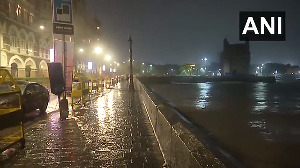 Pedal power may hold the answer to cheap and efficient sewage removal in some of the world's poorest slums -- if the work of a Cambridge University researcher can be taken into large-scale production.
Pedal power may hold the answer to cheap and efficient sewage removal in some of the world's poorest slums -- if the work of a Cambridge University researcher can be taken into large-scale production.M Phil graduate Nate Sharpe is planning to take his 'People Powered Poo Pump' to the slums of the Tanzanian capital, Dar es Salaam.
Roughly 80 per cent of Dar es Salaam's four million residents live in slum conditions.
His trials, if successful, could revolutionise the removal of faecal sludge from pit latrines common to slums in Africa, Asia and other parts of the developing world and lead to vast health benefits, a university release said.
Sharpe has designed a prototype bicycle-powered vacuum pump/tank system which works by putting the end of a hose into a pit latrine and cycling in place for a few minutes on a bike stand.
This allows the sludge to be sucked into a bucket attached to the back of the bike.
He hopes the bike could become a viable business proposition for budding entrepreneurs in Dar es Salaam's slums.
His work also features in the latest edition of Research Horizons.
"Many of the world's most densely-packed and poorest slums have terrible sanitation and sewage problems, which leads to huge amounts of disease and illness -- much of it preventable if conditions were improved.
"A lot of the issues
The idea has so many social, health and economic benefits.
An important aspect of the design is that it will be on a par with manual desludging technologies in terms of capital cost, he said.
Sharpe developed the idea for the bike while working on his MPhil at the Centre for Sustainable Development at Cambridge.
Working with the Centre's Dr Heather Cruickshank, Sharpe's project is one of around 35 annually that look to find innovative engineering solutions to a host of sustainability problems.
"Few if any of the previous solutions take into account the economic, social and geographical constraints found in slum areas.
The prevalence of people living on less than $2 a day means they live in tightly packed, unplanned settlements.
"The pump itself costs less than $100, less than 10 per cent of the next cheapest alternative," Sharpe added.





